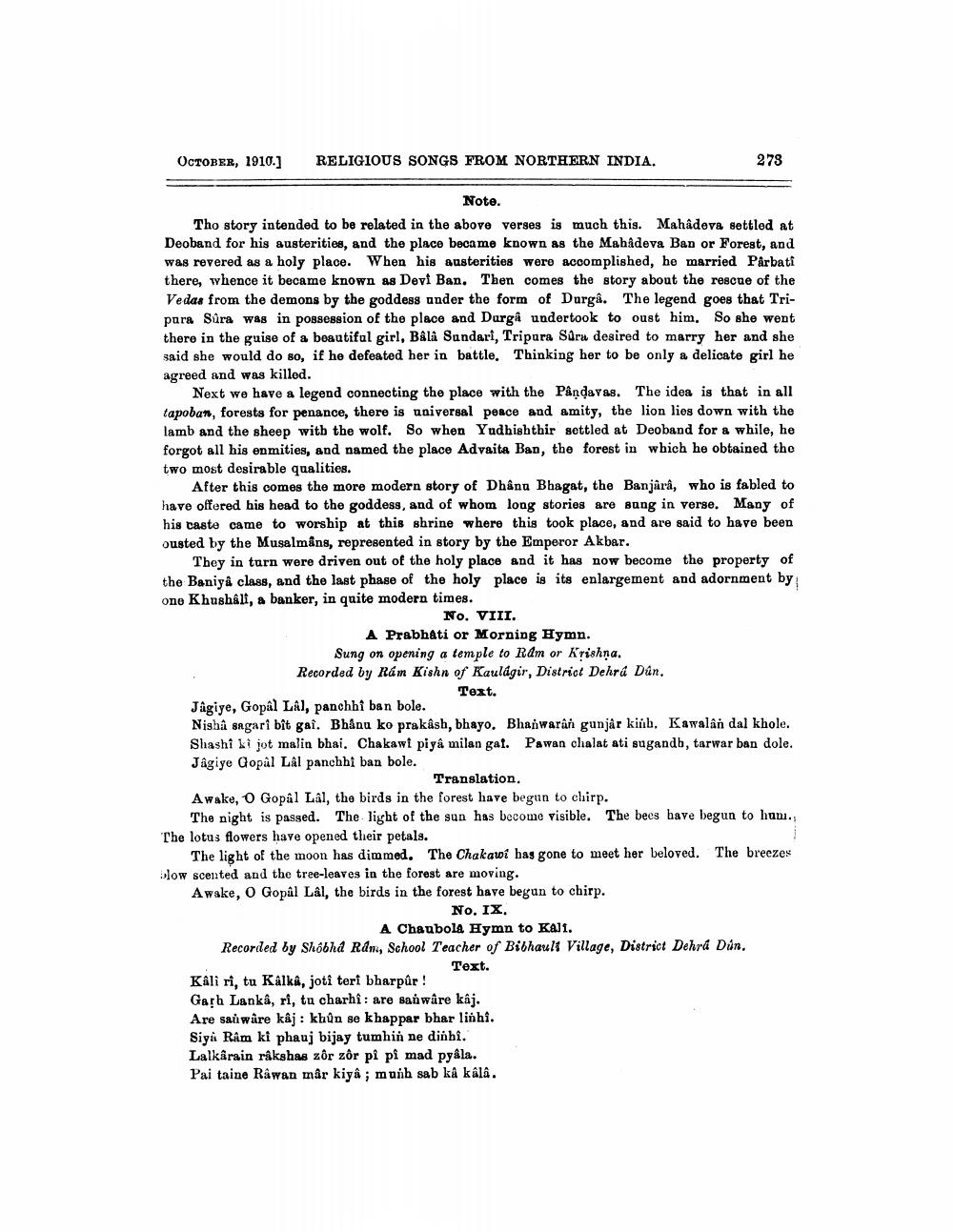________________
OCTOBER, 1910.)
RELIGIOUS SONGS FROM NORTHERN INDIA.
273
Note. Tho story intended to be related in the above verses is much this. Mahadeva settled at Deoband for his austerities, and the place became known as the Mahadeva Ban or Forest, and was revered as a holy place. When his austerities were accomplished, he married Pårbati there, whence it became known as Devi Ban. Then comes the story about the rescue of the Vedas from the demons by the goddess under the form of Durga. The legend goes that Tripara Súra was in possession of the place and Durgå undertook to oust him. So she went there in the guise of a beautiful girl, Bala Sundari, Tripura Sůru desired to marry her and she said she would do so, if he defeated her in battle. Thinking her to be only a delicate girl he agreed and was killed.
Next we have a legend connecting the place with the Pandavas. The idea is that in all tapoban, forests for penance, there is universal peace and amity, the lion lies down with the lamb and the sheep with the wolf. So when Yudhishthir settled at Deoband for a while, he forgot all his enmities, and named the place Advaita Ban, the forest in which he obtained the two most desirable qualities.
After this comes the more modern story of Dhậna Bhagat, the Banjärå, who is fabled to have offered his head to the goddess, and of whom long stories are sung in verse. Many of his caste came to worship at this shrine where this took place, and are said to have been ousted by the Musalmans, represented in story by the Emperor Akbar.
They in turn were driven out of the holy place and it has now become the property of the Baniya class, and the last phase of the holy place is its enlargement and adornment by one Khushalt, a banker, in quite modern times.
No. VIII. A Prabhati or Morning Hymn. Sung on opening a temple to Ram or Krishna. Recorded by Ram Kishn of Kaulagir, Distriot Dehra Dún.
Text. Jagiye, Gopal Lal, panchhi ban bole. Nisha angari bît gai. Bhånu ko prakash, bhayo. Bhanwaran gunjár kiüb. Kawalan dal khole. Shashi ki jot malin bhai. Chakawi piya milan gaf. Pawan chalat ati sugandb, tarwar ban dole. Jagiye Gopal Lal panchhi ban bole.
Translation. Awake, O Gopal Lal, the birds in the forest have begun to chirp.
The night is passed. The light of the sun has become visible. The bees have begun to hun. The lotus flowers have opened their petals.
The light of the moon has dimmed. The Chakawi has gone to meet her beloved. The breezes low scented and the tree-leaves in the forest are moving. Awake, O Gopal Lal, the birds in the forest have begun to chirp.
No, IX.
A Chaubold Hymn to Kali. Recorded by Shobhd Ram, School Teacher of Bibhault Village, District Dehrá Dún.
Text. Kali ri, tu Kalka, joti teri bharpûr ! Garh Lanka, ri, tu charhỉ : are sanwâre kaj. Are sau ware kaj : khûn se khappar bhar linhi. Siga Râm ki phauj bijay tumhin ne dinbi. Lalkârain råkshas zôr zôr pi pi mad pgâla. Pai taine Rawan már kiya ; munh sab ka kala.




